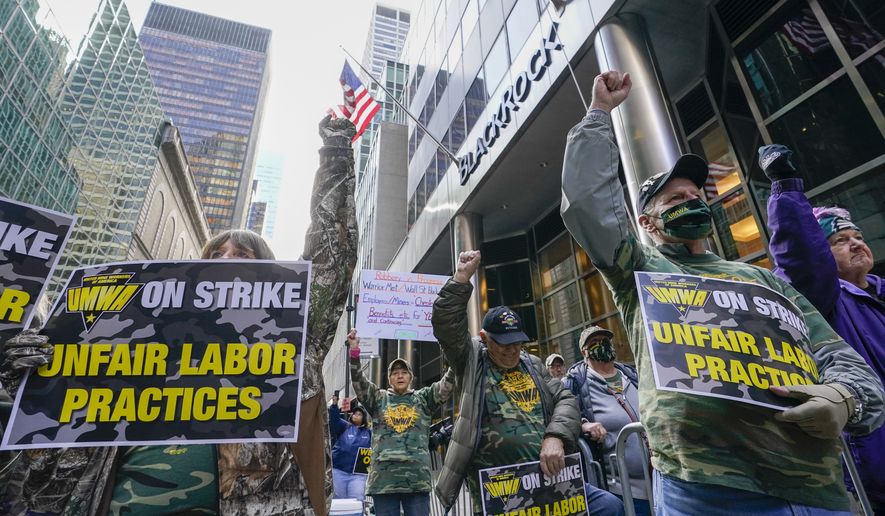Consumers’ Research sent a letter to 10 governors this week asking them to take a hard look at their states’ pension funds invested with BlackRock, as the group campaigns against the financial giant’s ties to Chinese companies.
The 10 states’ pension investments amount to nearly $67 billion, according to Consumers’ Research, citing public disclosures.
“We want them to take the risk seriously that is portended as BlackRock favors Chinese companies over U.S. ones,” Consumers’ Research President Will Hild told The Washington Times. “These pension investments could face significant losses from national security and geopolitical pressures, and they could also turn around and be used against their own state interests.”
Thursday’s letter is part of an ongoing campaign that the conservative-leaning group started this year accusing the Wall Street giant and its CEO, Larry Fink, of too-close ties to Chinese Communist officials and the massive economy they control.
China has the world’s second-largest economy behind the United States.
BlackRock, the world’s biggest investment firm in terms of assets under management, did not respond to a request for comment on the letter.
The pension figures used by Consumers’ Research were those available from public disclosures and do not represent all of the state pension money managed by BlackRock, Mr. Hild said.
Of the 10 states whose governors received the letter, Washington state with $13 billion and Florida with $10.7 billion top the list. West Virginia, with $2.1 billion in state pension funds managed by BlackRock, represented the smallest of the 10 states.
The letter cited growing concerns that U.S. investment in Chinese companies, which must have the approval of the Chinese Communist Party to operate, could prove problematic in a world where the interests of China and the U.S. do not always align.
The group’s “BlackRock Loves China” campaign is not the only voice urging caution.
In November, the U.S.-China Economic and Security Review Commission, which is convened by Congress, issued an annual report sharply critical of the laissez-faire attitude American investors appear to be taking toward China, recommending economic ties be subjected to much closer scrutiny.
“At stake in this clash of identities and sovereignty is the safety and security of the United States and its partners, friends and allies,” the report said. “The CCP is a long-term, consequential, menacing adversary determined to end the economic and political freedoms that have served as the foundation for security and prosperity for billions of people.”
Even some prominent left-wing figures have warned against the growing ties between Beijing and BlackRock, with investor George Soros attacking the situation in The Wall Street Journal.
“BlackRock’s unabashed gusto for Chinese markets flies in the face of concerns about China’s ascendant standing in the world, its authoritarian model of government, and its ambitions to supplant the U.S. as the pre-eminent world power,” the letter said. “Administrations of both parties have come to understand the great risk posed by the CCP and, breaking from prior policy of promoting China’s peaceful rise, labeled it a strategic rival against which the U.S. must compete.”
Along with its letter, Consumers’ Research released a “Consumers’ Warning” Thursday that highlights connections between BlackRock and China, and it released a digital ad targeted at the 10 states, which also includes Montana, Nebraska, Nevada, New York, Oklahoma, Pennsylvania and South Carolina.
“BlackRock is knowingly using investments funded by hard-working Americans to support companies directly tied to the Chinese Communist Party (CCP),” the warning said. “These investments made with Americans’ retirement savings are strengthening the Chinese economy and enhancing the Chinese military.”
On Friday, Florida Republican Gov. Ron DeSantis’ office released what it called a “preliminary statement” and said it was investigating the matter.
“We understand the concerns raised by Consumers’ Research with respect to any investment that might further the interests of the Chinese Communist Party,” the statement read. “With respect to these issues, we believe all institutional investors would benefit from clear and consistent guidance promulgated by relevant U.S. institutions, such as the Treasury’s Office of Foreign Assets Control (OFAC), who are uniquely qualified to identify and appropriately restrict any such investments.”
Mr. DeSantis is “an outspoken critic of the Chinese Communist regime,” but his office plans to review Florida’s pension portfolios.
“Currently, the FRS pension plan’s exposure to Chinese companies represents less than 3% of the total fund as a percent of market value,” the statement said. “Those investments are selected by private, third-party asset managers pursuant to processes designed to ensure all relevant risks are considered and all applicable laws and investment restrictions are followed, including the federal executive order relating to threats from certain companies of the People’s Republic of China.”
Some conservative lawmakers said they would approach the issue with caution. Todd Russ, a Republican in Oklahoma’s House of Representatives and a candidate for state treasurer, pointed to the complex nature of modern international markets and how difficult it might be to disentangle state pension investments.
“I can certainly understand the concern,” Mr. Russ said. “But when you’re that large of a holding company, you are going to be holding something from everyone because you have world markets.”
Oklahoma was seventh on the group’s list, with $5.8 billion in state pension money reported as managed by BlackRock.
• James Varney can be reached at jvarney@washingtontimes.com.




Please read our comment policy before commenting.